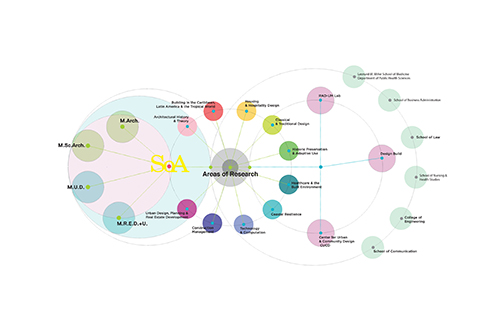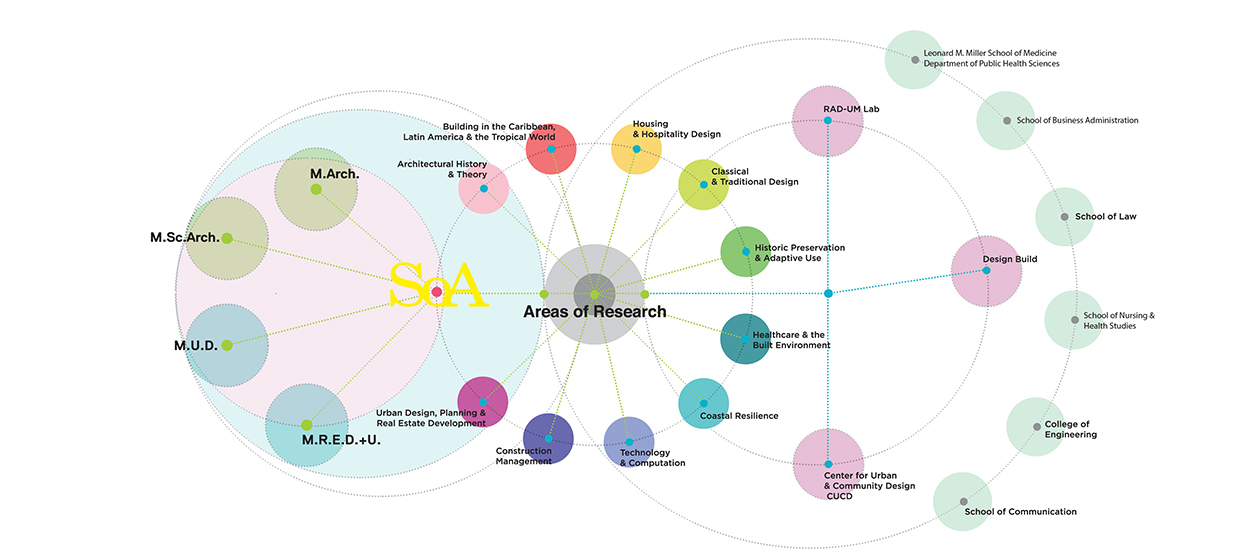Research is central to the U-SoA mission to advance knowledge in the discipline. Faculty and student research is evident in the work of the community engagement; developing the architectural form that responds to both tradition and innovation; learning through making; and the interplay of environment, technology, and regional identity.
Several “areas of research” provide a framework for the School’s multi-disciplinary research efforts.
The vital role of designers in shaping the physical environment and its relationship to the natural world is at the core of the school’s pedagogy. Urban Design and Real Estate Development, and the nexus between them form a critical field of inquiry supported by the School’s Center for Urban & Community Design and two distinct Master programs: the Master of Urban Design and the Master of Real Estate Development + Urbanism. In 1989, the School initiated its first graduate program, a post-professional curriculum titled Master of Architecture in Suburb and Town Design (current Master of Urban Design). Program Director (and former Dean) Elizabeth Plater-Zyberk, who founded the acclaimed and highly influential program, is recognized for her foundational role in the development of the New Urbanism as an alternative to urban and suburban sprawl. Subsequently, the School’s highly successful Master of Real Estate in Development + Urbanism program, an interdisciplinary initiative of the schools of Architecture, Business Administration, and Law, was developed by Associate Professor Charles Bohl in 2008 with the assistance of the Knight Foundation. The program blends the fundamentals of real estate development with livable community planning and design. More recently, Rodolphe el-Khoury, formerly the director of urban design at the University of Toronto’s Daniels Faculty, was appointed U-SoA Dean.
The core mission of Design/Build is to give students hands-on experience of architecture, engaging them with the underserved or not-for-profit community with prototypical solutions. This mission unites students and the community in ways that are mutually beneficial while instilling the notion that architecture is a civic endeavor. Prototypical projects underscore that well-conceived architecture continues to have benefited by inciting further consideration and investigation. For Design/Build, it is the fabric of the repeated project that makes up so much of everyday life and the bulk of the built environment.Design/Build students spend many hours drawing and imagining the buildings they design, realizing the ultimate goal of their ideas, through construction. Ideas about physical weight, texture, and temperature of materials, and the role tolerances play in craft and longevity of construction, are best understood through a building.
The program is open to graduates from Architecture, Engineering and Construction programs. The curriculum will broaden educational and career options for students. Formal knowledge and experience in project and construction management are highly sought after by, not only architectural firms but also construction companies and real estate developers. With the guidance of the Program Director, students design a curriculum suited to their own interests and time constraints. The program is a non-thesis program and will consist of a minimum of 36 credit hours. This includes 15 credits of required core courses, 10 credits of professional practice – practicums and internship – and 11 credits of courses as a free elective or within a selected track. Most courses will be offered in the late afternoon or evening to allow students to work and participate in required practicums or internships at leading organizations during the day.
Responsive Architecture Design is premised on the notion that every building or landscape component can be equipped with computational power. Responsive Architecture Design research is supported by the School’s RAD-UM lab, which provides resources and expertise for project-based research on the spatial ramifications of embedded technology and ubiquitous computing. Projects at RAD-UM are set up for multi-disciplinary collaboration and for partnerships with industry.
Changing climate patterns are impacting communities in coastal regions across the globe due to rising sea levels and increasing temperatures. Architects and urban designers play a central role in developing robust adaptation strategies by addressing climate stressors in their designs. Research, innovation, and community outreach are central and connected aspects of building coastal resiliency.
Healthcare Architecture is a growing and developing the field with design implications that cover a wide range of scales, from urban planning to the design of a single patient room. U-SoA explores these different scales while providing a multi-disciplinary approach to Healthcare Architecture. Collaborations within the University of Miami, including the Leonard M. Miller School of Medicine, the School of Business, and the College of Engineering, provide students a dynamic and experiential learning environment.
Historic Preservation is at the center of discourse about stewardship and the environment. Miami is an excellent laboratory of contemporary preservation and adaptive use strategies, including preservation of modern architecture and the use of historic preservation as community planning. In addition, the School’s location makes it an excellent base to examine the cultural heritage of Cuba and the Caribbean.
Classical and traditional architecture is evolving in relation to new paradigms of research and practice, such as digital media and fabrication, sustainability, ecology, and emerging economies. A progressive classicism that seeks to address the pressing issues of our cities, towns, and landscapes, is the basis for research spanning popular, professional, and academic discourse.
Housing and hospitality are not only foundation building blocks for modern urban centers, but they are also critical areas of lifestyle innovation and for the application of new ideas about resilience and sustainability. This field of inquiry is supported by the School’s Master of Urban Design and Master of Real Estate Development + Urbanism programs. In coordination with the Master of Urban Design and Master of Real Estate Development + Urbanism programs, the School has increasingly engaged areas of housing and hospitality design through studios and focused seminars. Although new, this area of research capitalizes on the University and the School’s regional context.
Miami's location is a starting point for examining relevant issues of Tropical Architecture, and the study of Latin America and the Caribbean. Located on the periphery of the Caribbean Basin, in a sub-tropical region at the intersection of diverse cultural and ecological regions, U-SoA has long been engaged in the investigation of the environment, regional identity, and vernacular traditions. More recently, Miami's accelerated urban and cultural transformation has brought pan-Americanism and issues associated with "the tropical" into a new geographic and conceptual focus.
The School offers broad opportunities to explore Architecture across a range of historical and theoretical discourses. Research methodologies, modes of critical thinking, and the development of writing skills within the fields of architecture and architectural history and theory are emphasized. Recognizing that architecture is an inherently interdisciplinary endeavor, this field of inquiry is supported by the expansive resources of the University of Miami. Initiated in 2015 as a Research and Writing track of the Master of Science in Architecture program, Architectural History and Theory are supported by numerous elective history and theory offerings within the School, and by the University curriculum.
U-SoA and the Center for Computational Science (CCS @ UM) are collaborating on their newest focus area, designed to create services and training involving Smart Cities concepts. Research is central to the U-SoA mission to advance knowledge in the discipline. Faculty and student research is evident in the work of the community engagement; developing the architectural form that responds to both tradition and innovation; learning through making; and the interplay of environment, technology, and regional identity. Several “areas of research” provide a framework for the School’s multi-disciplinary research efforts.





